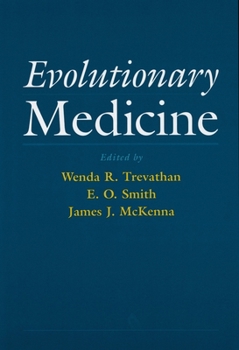Evolutionary Medicine
Select Format
Select Condition 
Book Overview
This volume is a comprehensive survey of the field and contains work b y such leaders as Paul Ewald, Melvin Konner, and Randolph Nesse. Topic s include anxieties and phobias, substance abuse, SIDS, high-blood pre ssure, obesity, vitamin and mineral deficiencies, sensory disorders, a nd reproductive disorders including cancers. Useful as a supplementary textbook for a variety of courses, this book will prove an invaluable resource in medicine, biology, anthropology, and psychology.
Format:Paperback
Language:English
ISBN:0195103564
ISBN13:9780195103564
Release Date:May 1999
Publisher:Oxford University Press
Length:496 Pages
Weight:1.38 lbs.
Dimensions:0.9" x 6.0" x 9.1"
Customer Reviews
2 ratings
Evolutionary Medicine is a Powerful way to Look at Disease!
Published by Thriftbooks.com User , 17 years ago
While a bit dry, this book provides a great overview of evolutionary medicine and how it applies to clinical medical problems such as asthma, giving birth, colic. Evolutionary Medicine explains the "why" behind why diseases occur. It's rarely purely genetic, with epigenetic and environmental factors playing a key role in most modern chronic medical conditions! The chapters on colic and giving birth were particularly interesting in my opinion and offer some great practical tips. Some of the evidence is a bit on the theoretical side (ex: the benefits of elevated IgE levels), but overall very clinically relevant. Paul 3rd year medical student paultheo2004@yahoo.ca
Some good chapters on fascinating new field
Published by Thriftbooks.com User , 24 years ago
This book applies Darwin's theory of evolution to medicine and that's very exciting. It's exciting because the theory of evolution turns out to be a framework with impressive explanatory power in the area of health and disease. Why do babies in modern Western societies show more excessive crying than infants of !Kung San hunter-gatherers? What makes many women that give birth in modern high-tech hospitals still unsatisfied with the process? Why do so many modern women get breast cancer? Evolutionary medicine proposes answers, sometimes controversial, but definitely almost always worth considering. Why only four stars then? Perhaps it's because the field is still maturing but I thought only six of the eighteen chapters of the book showed clear arguments, high-quality writing, and didn't require a Ph.D. in biochemistry to follow the details. (I liked the chapters about evolutionary perspectives on infant crying, sudden infant death syndrome, obstetrics, nutrition, psychiatry, and breast cancer). And finally, readers should keep in mind that "Evolutionary Medicine" is a university textbook. For a more accessible introduction into this exciting new field they should read Nesse and Williams' "Why We Get Sick".






